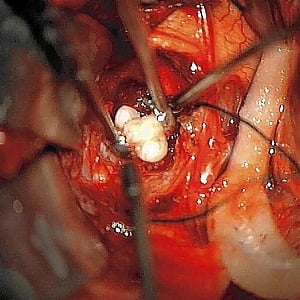
Teratoma tumours are thankfully quite rare, but their discovery can be quite alarming. Typically containing body parts such as organs, hair, teeth and limbs, doctors are still not exactly shure why they form.
Examples of teratoma tumours in people
In 2008 doctors in Colorado Springs in the US removed a microscopic tumour from a newborn only to find it contained a tiny foot and other partially formed body parts including another partially formed foot, a hand and a thigh.
Cracked reports that a child born in Korea had two separate growths, one containing an eye, a trachea, various internal organs and even a brain. The other growh contained bones, intestines, vertebrae and both were covered in a membrane that contained an umbilical cord.
In 2007 a Japanese woman had a teratoma tumour containing a lump holding a head, one fully formed eye and a number of internal organs removed from her right ovary.
In Februay 2014 the New England Journal of Medicine reported that doctors in Maryland in the US found fully-grown teeth growing in a 4 month old baby boy's enlarged head.
The tumour was successfully removed but the baby will have to receive hormone treatment and regular MRI scans to ensure the tumour does not return.
Teratoma tumours are nothing new: Livescience reports that Spanish archaeologists found the remains of a 30- year old Roman woman who died 1 600 years ago with a calcified tumour in her pelvis, a bone and four deformed teeth embedded within it.
Why does this happen?
The word teratoma comes from the Greek words "teras" and "onkoma" which translate to "monster" and "swelling," respectively.
Pathology Student explains that teratomas are generally simply a special type of germ cell tumour in which there is actual tissue development - not just germ cells themselves.
Tumours of all types are basically masses of cells that reproduce when and where they shouldn't, often endlessly. The location of the tumour often determines what kind of cells it consists of. In the case of teratomas, however, the cells can be of virtually and kind found throughout the human body, these cells will then replicate as if they were legitimately creating that kind of entity. This is the reason teeth, limbs and even brains can form where they aren't supposed to.
Dr James T Rutka, paediatric neurosurgeon at the University of Toronto'd department of surgery told Baltimore Sun that doctors have found many bodily structures, including fingers and even partially formed humans in teratomas of this ability to form just about any part of the body.
Writing for the respected medical journal Plos, author of Discovery: Science as a Window to the World Dr Ricki Lewis theorises explains that a teratoma develops from a wayward sperm or egg that erroneously activated its developmental programme.
Alternatively, it could be that a somatic cell escaped from an early embryo that didn't realise it was no longer a part of the whole.
Watch: American Kiera Echol was diagnosed with an ovarian teratoma. Her ovarian tumour contained brain cells, which caused her body to trigger an immune response to attack her own brain leading to bizarre hallucinations. From the Discovery series: Monsters Inside Me
Read more:
Indian boy has 232 teeth surgically removed
Bizarre uses for bodily fluids
Bizarre things people do in their sleep
Image: Doctors remove the teeth and the tumour from the boy’s head during brain surgery. New England Journal of Medicine




 Publications
Publications
 Partners
Partners











